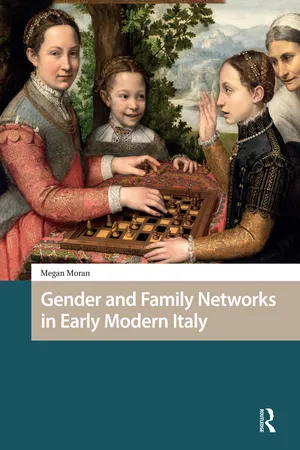
- English
- ePUB (mobile friendly)
- Available on iOS & Android
eBook - ePub
Gender and Family Networks in Early Modern Italy
About this book
Women from the Ricasoli and Spinelli families formed a wide variety of social networks within and beyond Florence through their letters as they negotiated interpersonal relationships and lineage concerns to actively contribute to their families in early modern Italy. Women were located at the center of social networks through their work in bridging their natal and marital families, cultivating commercial contacts, negotiating family obligations and the demands of religious institutions, facilitating introductions for family and friends, and forming political patronage ties. This book argues that a network model offers a framework of analysis in which to deconstruct patriarchy as a single system of institutionalized dominance in early modern Italy. Networks account for female agency as an interactive force that shaped the kinships ties, affective relationships, material connections, and political positions of these elite families as women constructed their own narratives and negotiated their own positions in family life.
Frequently asked questions
Yes, you can cancel anytime from the Subscription tab in your account settings on the Perlego website. Your subscription will stay active until the end of your current billing period. Learn how to cancel your subscription.
No, books cannot be downloaded as external files, such as PDFs, for use outside of Perlego. However, you can download books within the Perlego app for offline reading on mobile or tablet. Learn more here.
Perlego offers two plans: Essential and Complete
- Essential is ideal for learners and professionals who enjoy exploring a wide range of subjects. Access the Essential Library with 800,000+ trusted titles and best-sellers across business, personal growth, and the humanities. Includes unlimited reading time and Standard Read Aloud voice.
- Complete: Perfect for advanced learners and researchers needing full, unrestricted access. Unlock 1.4M+ books across hundreds of subjects, including academic and specialized titles. The Complete Plan also includes advanced features like Premium Read Aloud and Research Assistant.
We are an online textbook subscription service, where you can get access to an entire online library for less than the price of a single book per month. With over 1 million books across 1000+ topics, we’ve got you covered! Learn more here.
Look out for the read-aloud symbol on your next book to see if you can listen to it. The read-aloud tool reads text aloud for you, highlighting the text as it is being read. You can pause it, speed it up and slow it down. Learn more here.
Yes! You can use the Perlego app on both iOS or Android devices to read anytime, anywhere — even offline. Perfect for commutes or when you’re on the go.
Please note we cannot support devices running on iOS 13 and Android 7 or earlier. Learn more about using the app.
Please note we cannot support devices running on iOS 13 and Android 7 or earlier. Learn more about using the app.
Yes, you can access Gender and Family Networks in Early Modern Italy by Megan Moran in PDF and/or ePUB format, as well as other popular books in History & Gender Studies. We have over one million books available in our catalogue for you to explore.
Information
Table of contents
- Cover
- Half Title
- Title
- Copyright
- Table of Contents
- List of Figures and Family Trees
- Note on Florentine Currency, Units of Measure, and Dates
- Acknowledgements
- Introduction
- 1. Marriage and Family Authority: Wives, Mothers, and Widows
- 2. Siblings and Family Ties: Sisters, Brothers, and Half-Siblings
- 3. Secular and Sacred Networks: Between Convent Communities and Family Life
- 4. Amicizia e Famiglia: Female Friendship and Sociability
- 5. The Politics of Social Networking: Gender, Family Strategy, and Political Culture
- Conclusion
- Appendix: Family Trees
- Index